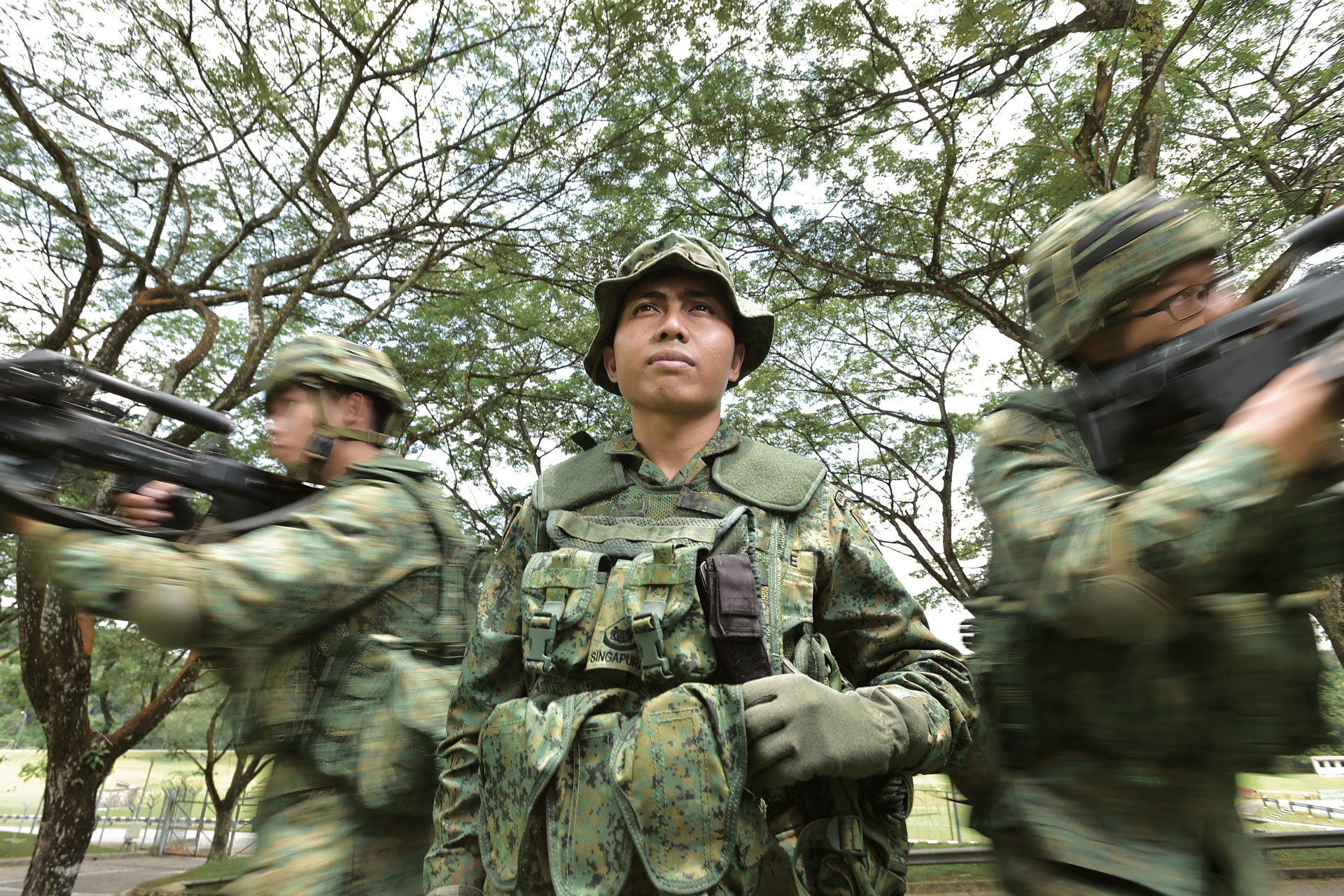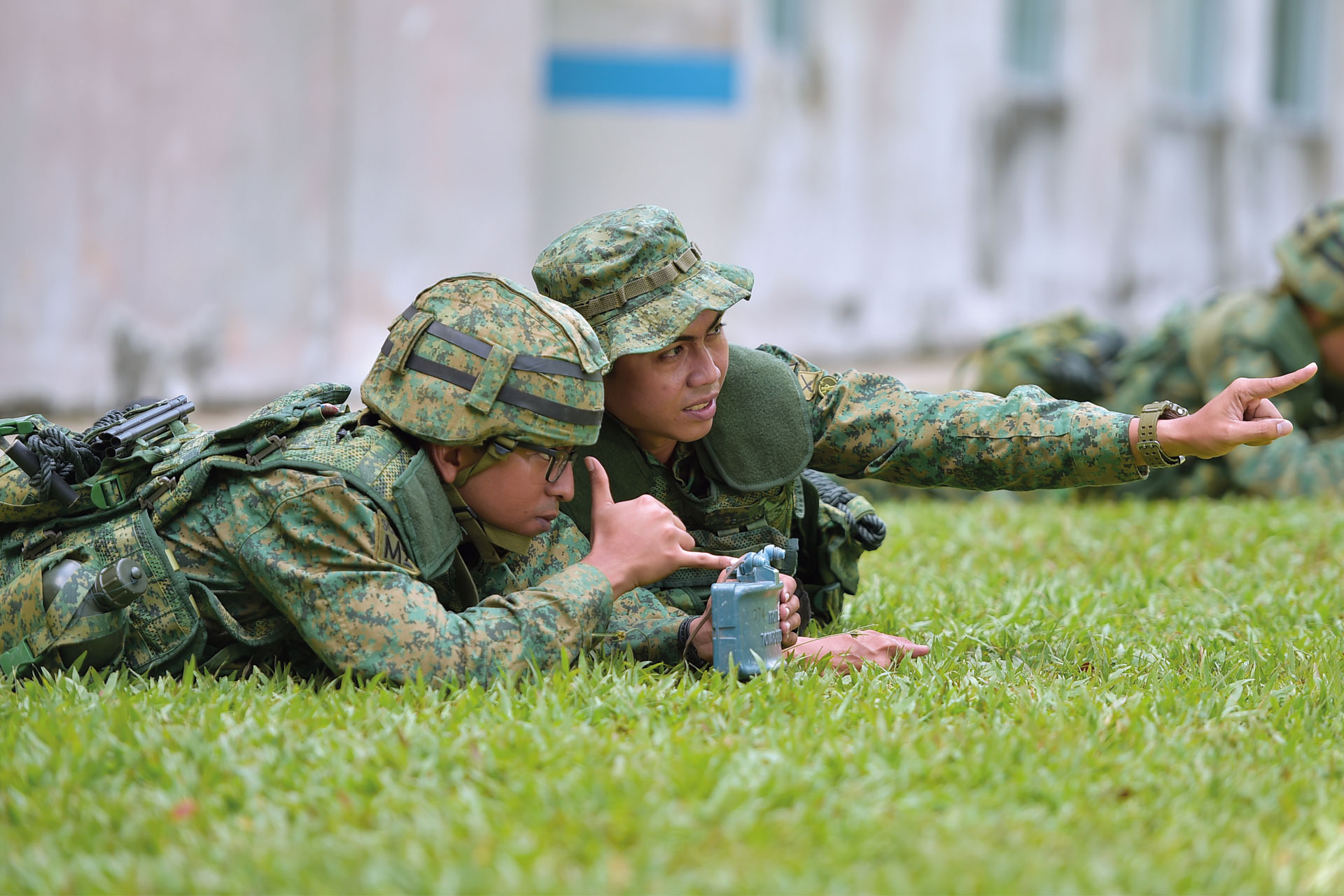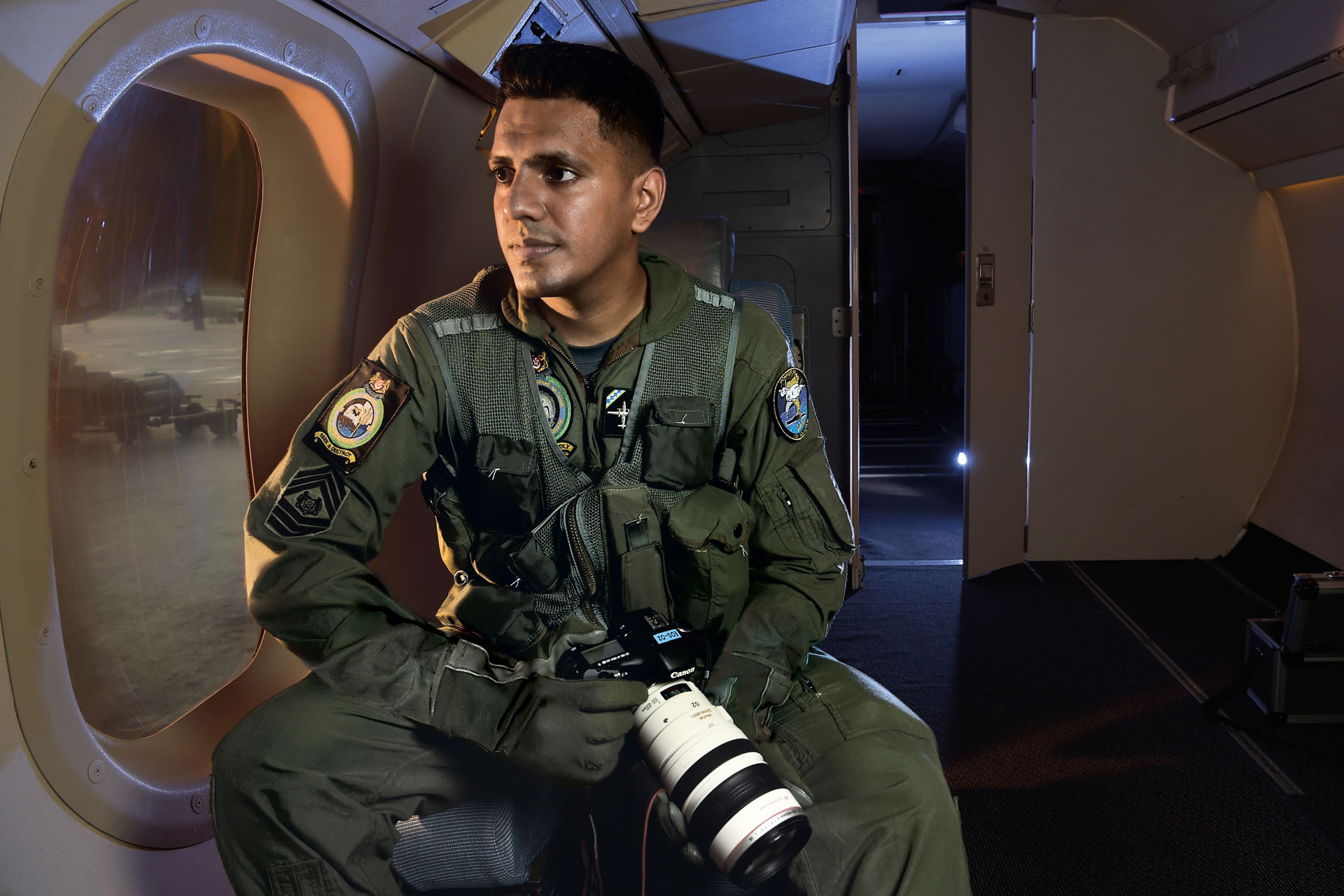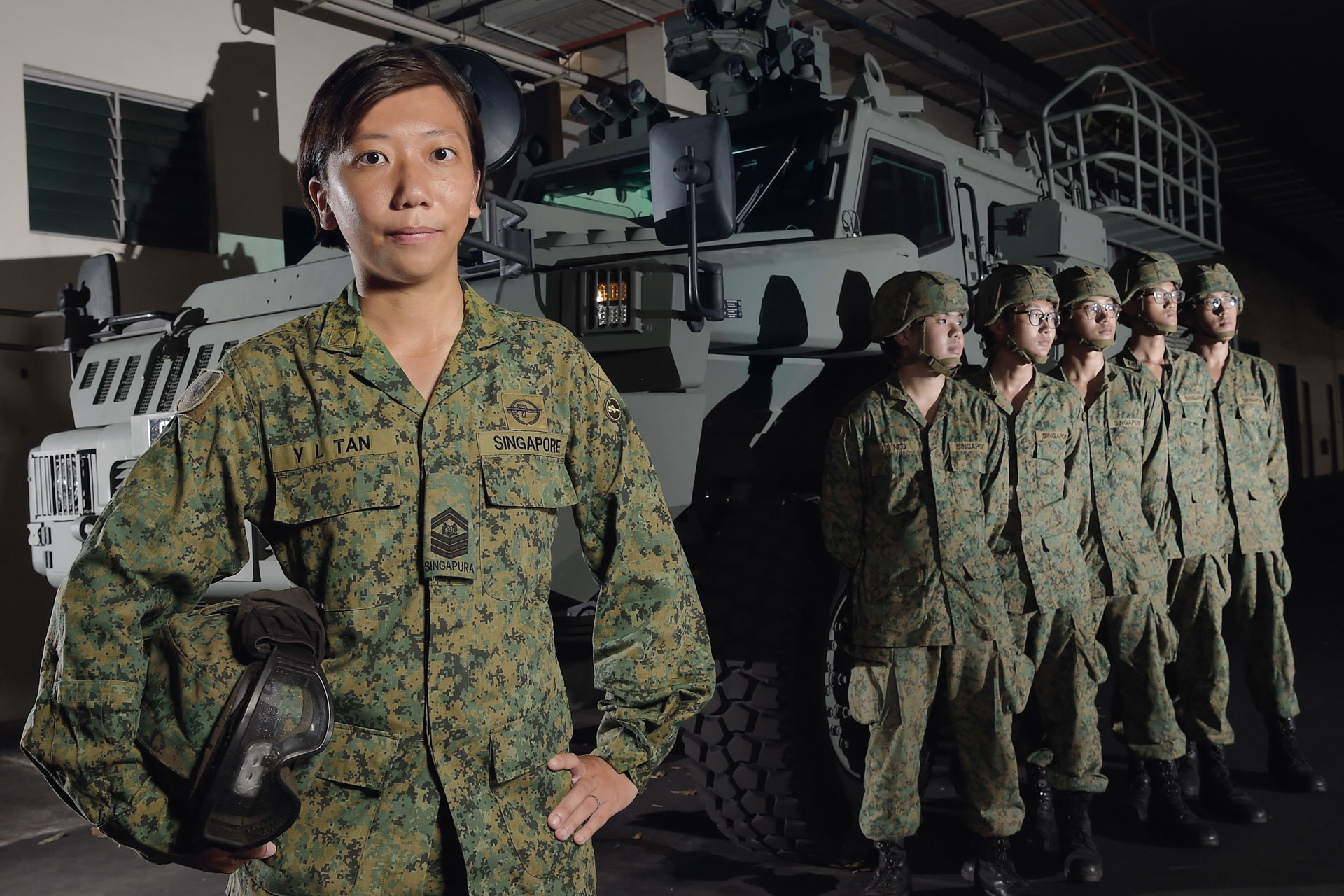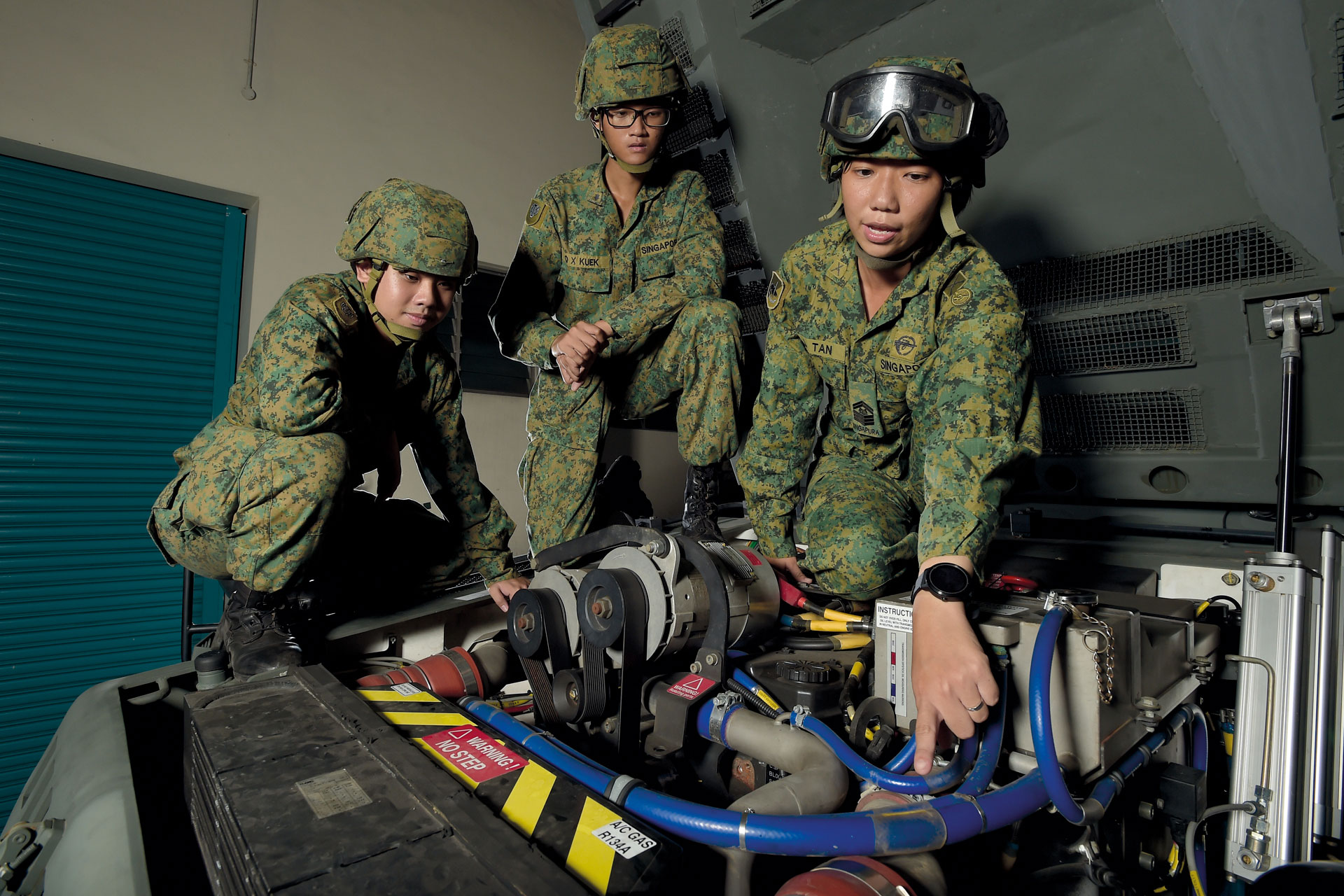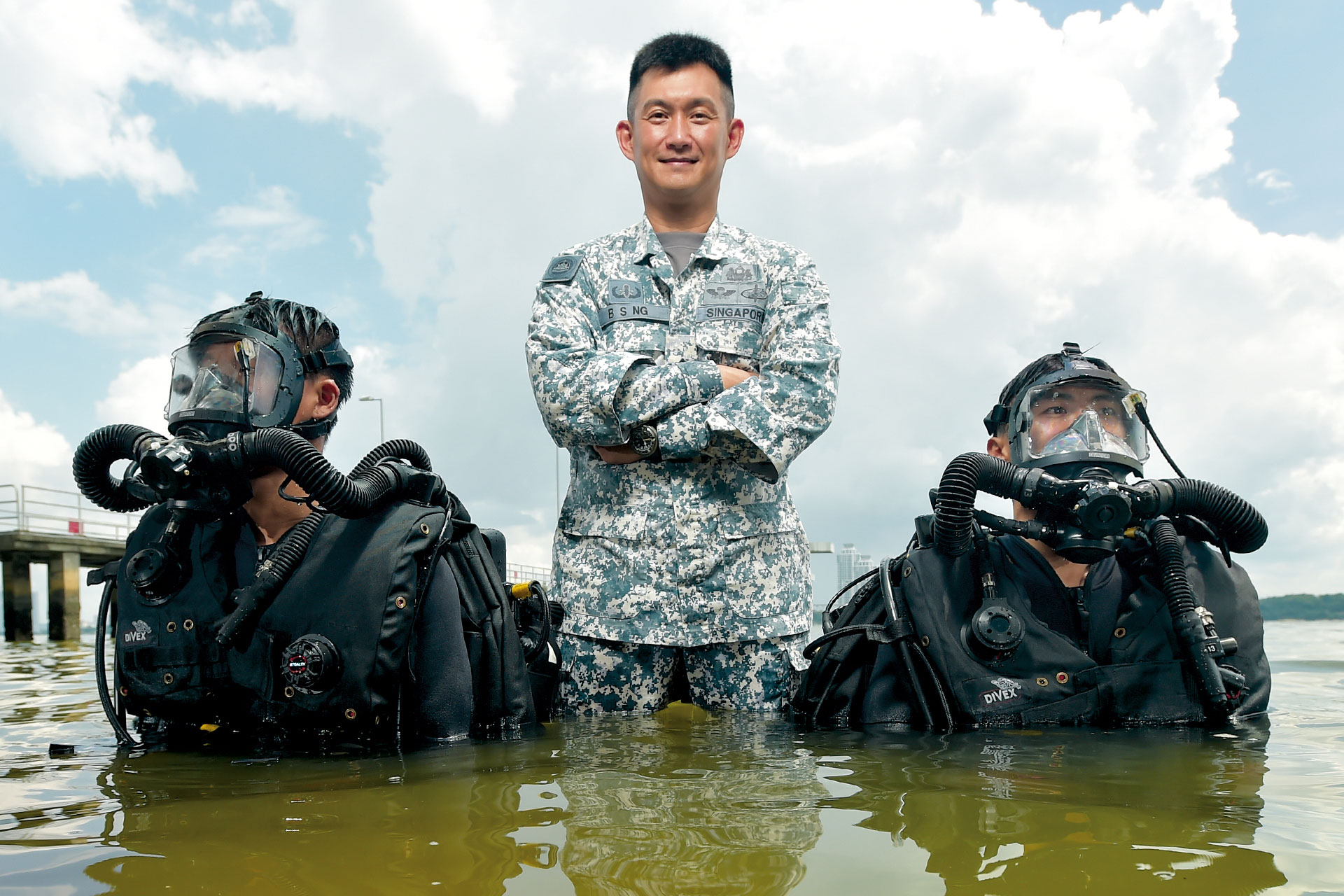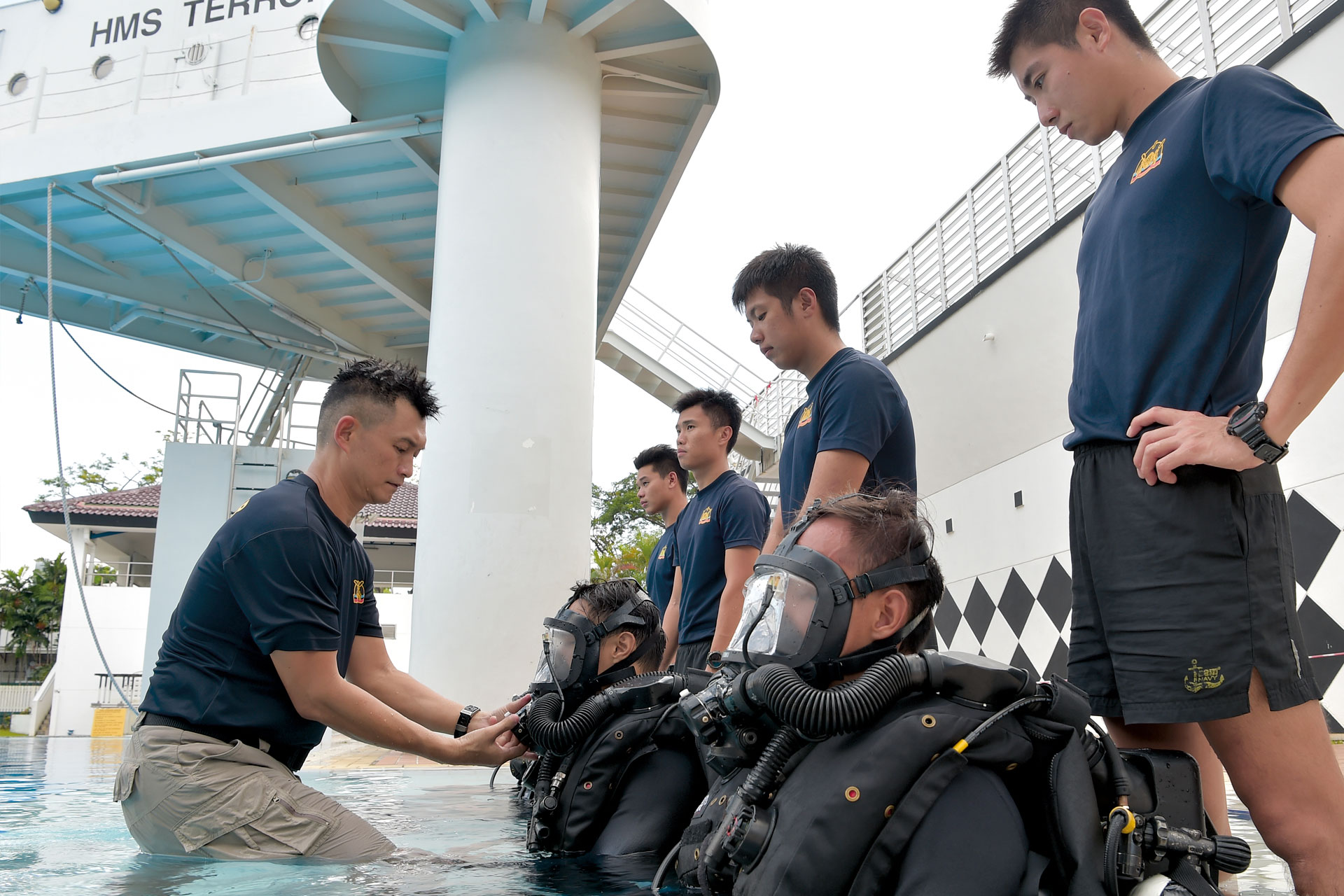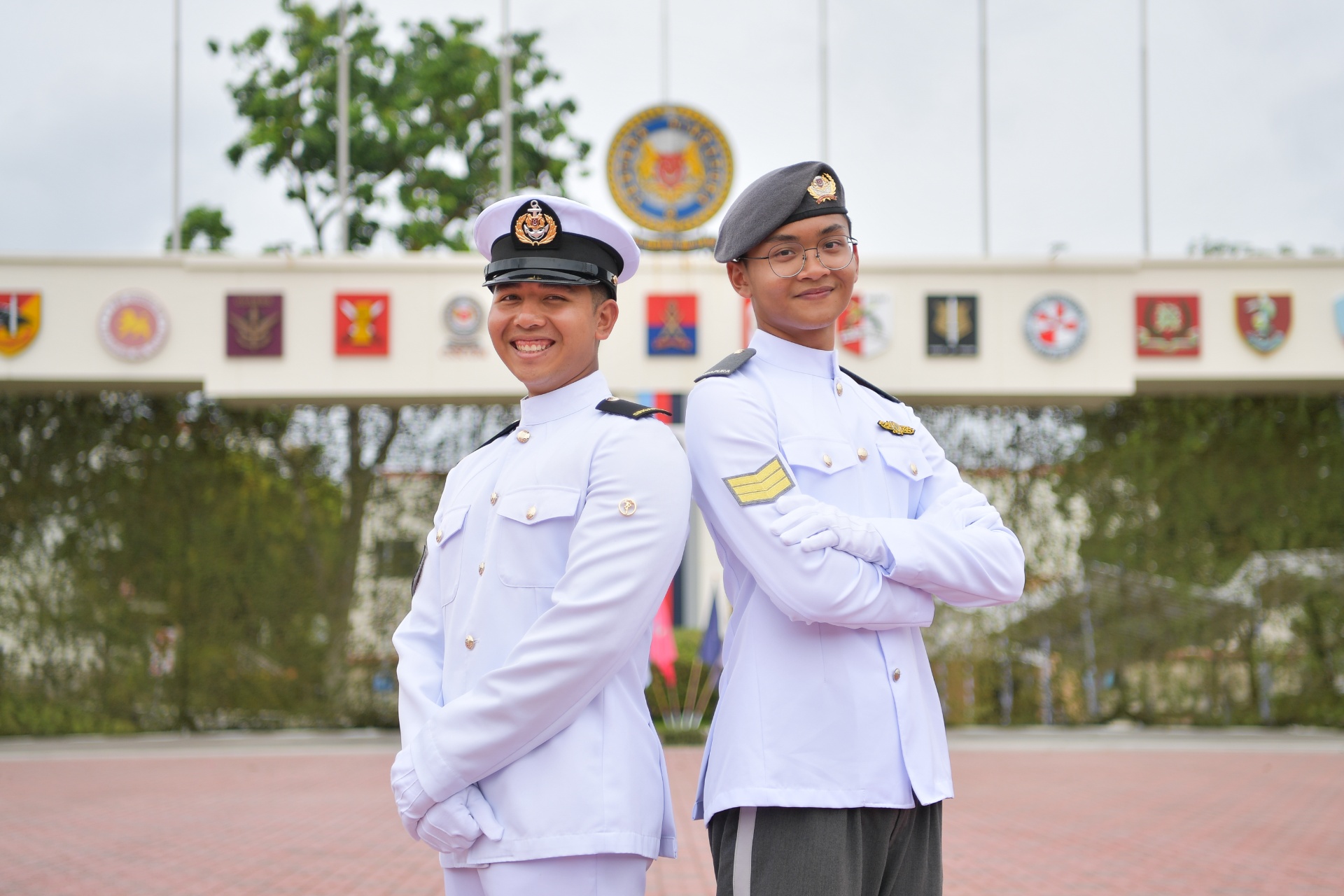PEOPLE
IN THEIR ELEMENT
01 Jun 2018
FROM NURTURING THE NEXT GENERATION OF SOLDIERS TO ROUGHING IT OUT WITH THEIR FELLOW TROOPERS, THESE WOSPECS LOVE THEIR JOBS.
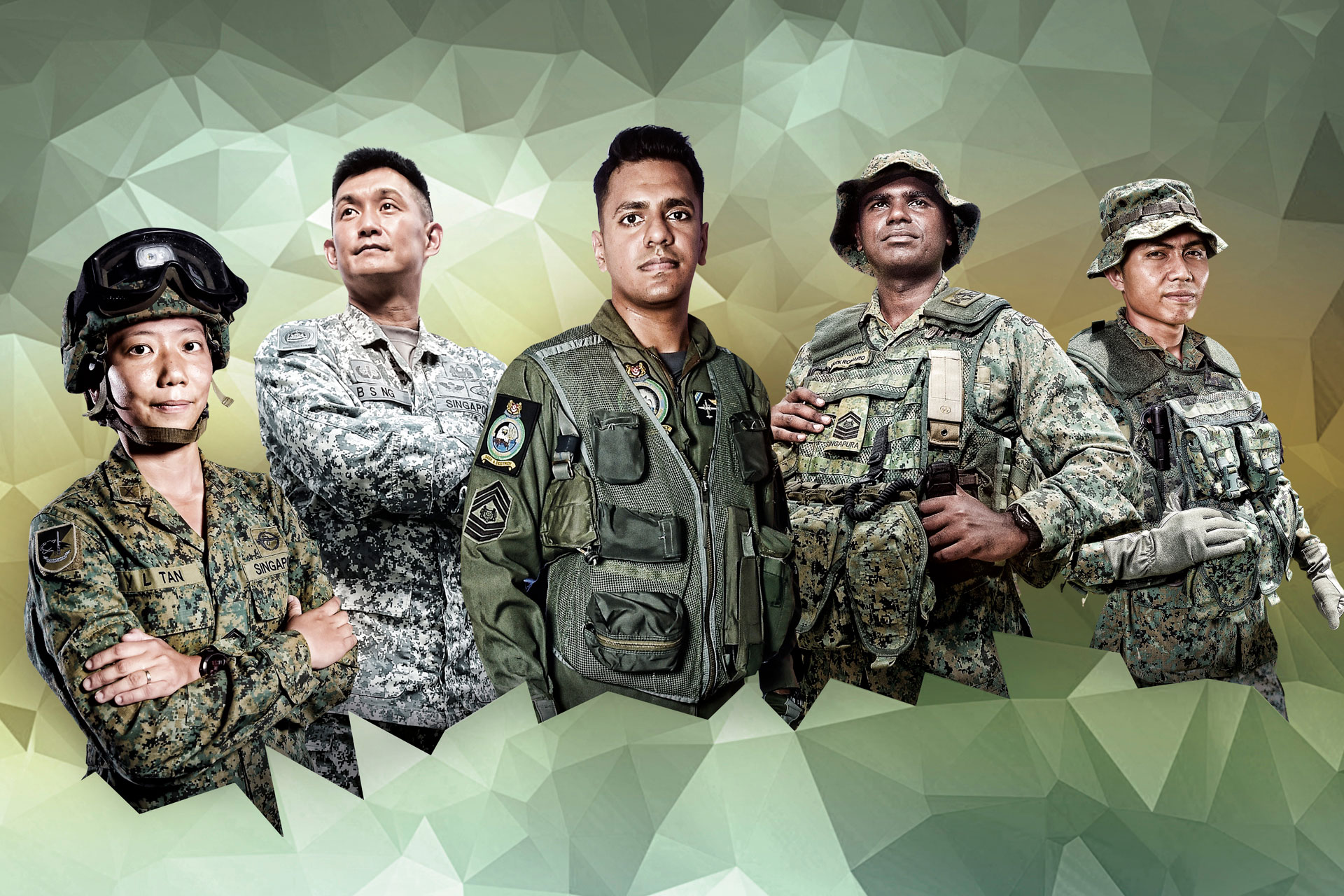
Gone are the days when the impending footsteps of a stern encik ("Sir" in Malay; also an affectionate term for warrant officers) strike fear in troopers.
The Warrant Officers and Specialists (WOSpecs) today are your friend, brother (or sister) and even a fatherly figure. In fact, when PIONEER was with these enciks, they were cheerily greeted by everyone they met. Some of their peers or trainees even poked their heads in during the interviews, eager to chime in a good word or two.
While the WOSpecs still uphold strict standards of regimentation, discipline and training in the Singapore Armed Forces (SAF), they are now also taking on more leadership roles. Five of them share what it is like to be the next generation of warfighters, trainers and leaders.
3WO MUHAMMAD ASHIK
Assistant Chief Trainer, Specialist Cadet School (SCS) II
MAN OF ACTION
"It was the best thing that happened to me." This was how 3rd Warrant Officer (3WO) Muhammad Ashik, 31, summed up his deployment experience.
Just two years after signing on with Headquarters (HQ) Guards, 3WO Ashik was deployed to Afghanistan for five months as part of the SAF's contributions to international peacekeeping missions.
As a weapon locating radar operator, the then-23-year-old's role was to detect and warn the base of any incoming fire.
It was there that he learnt the harsh realities of war. An attack took place the day he was scheduled to land, causing him and his team to fly in a day later.
"That was when it struck me that this was the real deal — we could have been the ones who were attacked if we had landed a day earlier," recalled 3WO Ashik.
Two days later, a rocket attack struck a short distance off the campsite. Today, he still vividly remembers the whistling sound that accompanied the incoming fire and the aftermath of the explosion.
"It was a wake-up call. We had never been exposed to this. (We had to learn) to detect the incoming rounds 'cos our lives depended on it."
The push factor
Challenging himself physically and mentally are part of why 3WO Ashik joined the Army. He has enjoyed all things military since his National Cadet Corps days in secondary school.
To push himself further, the Assistant Chief Trainer from SCS II signed up for the Ranger's Course in 2011.
Despite the constant stress and fatigue (he only had three hours of sleep on some days!), 3WO Ashik conquered one of the SAF's toughest courses.
His takeaway? The importance of perseverance.
The Temasek Polytechnic alumnus said: "If we really need to go to war, I feel that I'm more prepared…as I've gone through so much hardship and came out of it more ready than ever."
Tough love
As a soldier, 3WO Ashik is tough. As a friend, he's tougher.
During his stint in HQ Guards in 2016, he had two sergeants who were overweight.
"Actions speak louder than words," explained 3WO Ashik. "I told them what to eat and drink, then I ate exactly the same things to prove that it was possible.
"I also did physical training together to push them. When they see you go through the same suffering, it makes them feel like they're not alone in this journey."
His effort paid off: each of them lost almost 20kg. This incident also changed his mindset about how he trained his men. "I realised that there are different ways to approach a situation," mused 3WO Ashik.
If his trainees' performance is less than ideal, he doesn't chide them immediately.
Instead, he speaks to them to find out if they are facing problems and does his best to help them. For instance, a sports injury was the reason behind one of his sergeants' weight gain.
"As a commander, you get to experience their journey with them, and this is why I love what I'm doing."
SOMEONE WHO INSPIRED HIM
Master Sergeant (MSG) Inndramawan - Charlie Company WOSpec Trainer, Infantry Combat Training Centre, Infantry Training Institute. He was 3WO Ashik’s predecessor as a platoon sergeant in HQ Guards.
"MSG Inndramawan told me once that if he sees someone doing something, he cannot walk away without lending a hand. This sentence really made an impact on me. So even if my men are doing simple chores like cleaning the stores, I will do it with them."
What his supervisor says:
"The outstanding servicemen that 3WO Ashik produces speaks volumes of his ability to lead and train. He leads by example, believes in tough training and expects nothing less from the servicemen under his charge."
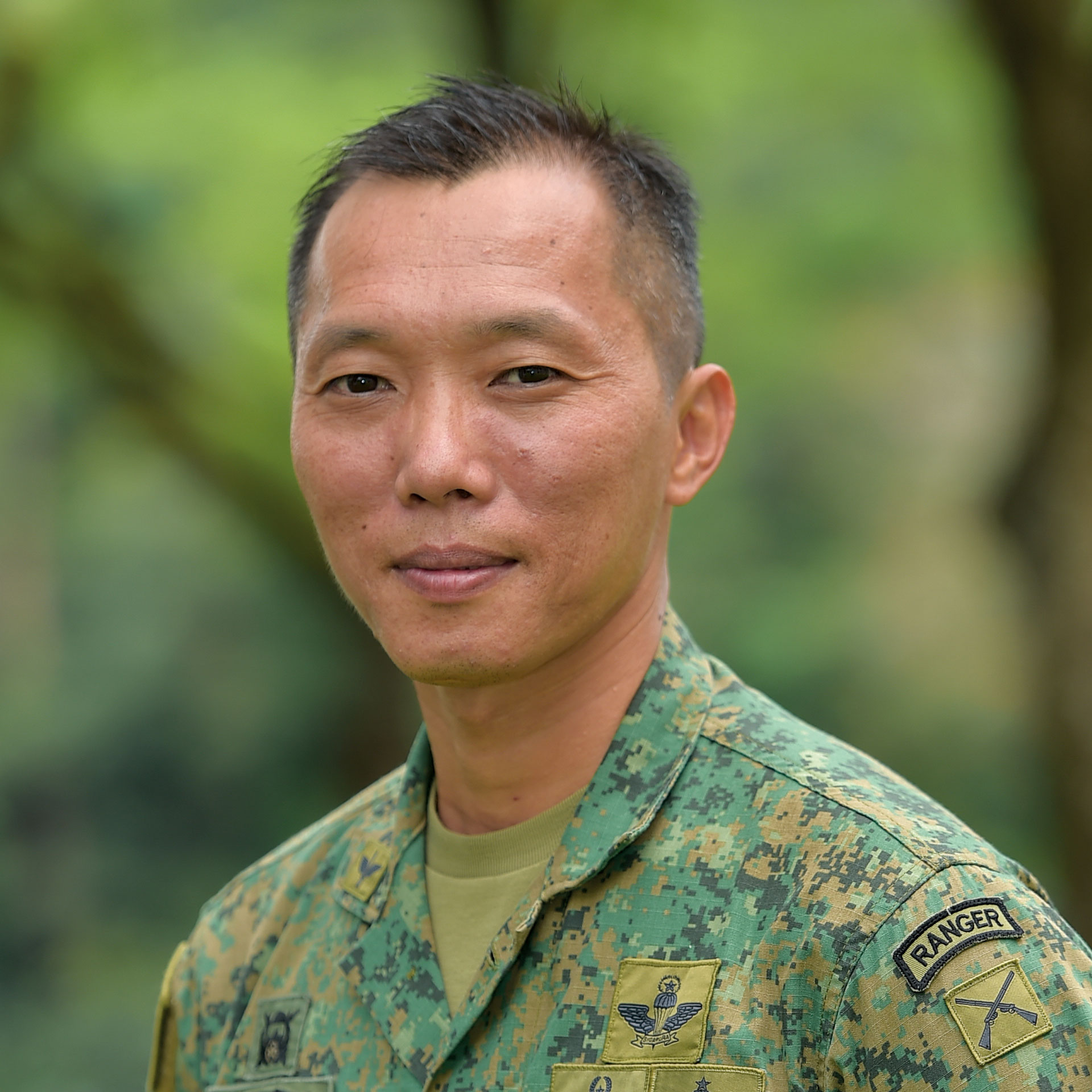
MSG ELIAS PARAMESWARAN
Fokker 50 Air Crew Specialist, 121 SQN
UNDER HIS WING
When United States destroyer USS John S McCain collided with an oil tanker off the coast of Singapore last August, Master Sergeant (MSG) Elias Parameswaran was among those activated to search for the missing sailors.
"The call came in late on Friday night and we were scheduled to fly at 5am the following day. We used our binoculars to search for debris and dropped smoke markers in these areas for the Navy to take a closer look," recalled the 31-year-old, who flew on the Fokker 50 Maritime Patrol Aircraft (MPA) for a seven-hour mission.
A loadmaster instructor with the Republic of Singapore Air Force's 121 Squadron (SQN), MSG Elias flies on both the Fokker 50 Utility Transport Aircraft (UTA) and the MPA. The former is mainly used for transportation while the latter is used for maritime patrol and surveillance missions.
"Although it was a sad situation, we had to be professional about it. There was a limited time frame, so we had to be quick and thorough when searching."
Always speak up
Teamwork, professionalism and safety are values that MSG Elias holds close to his heart. The Air Crew Specialist (ACS) also makes it a point to cultivate these values in his trainees.
"Sometimes, the more experienced ones act like they know everything, but as instructors, we have to point out that certain things have changed, teach them the new methods and explain why they are in place."
When he was training his former instructor, MSG Elias did not hesitate in correcting him. To his surprise, his senior took the comment positively and even commended him for it.
"He was proud that I had grown so much and was able to correct him," said the Ngee Ann Polytechnic alumnus with a laugh.
"When it comes to flying, we have to be very professional and let the trainee know that this is not the way we do things, even if he is your former leader."
Ground-up innovation
It's no surprise that, as the ones involved in the thick of action, WOSpecs often come up with ground-up initiatives to improve efficiency.
In 2012, MSG Elias had the idea of digitising the weight and balance computation of cargo on board the UTA. In the past, loadmasters had to manually calculate the weight of the cargo and where to place it on the UTA to balance the load evenly. The process took about 30 minutes.
Today, loadmasters just need to key the essential figures into an Excel sheet, saving more than 20 minutes. Since its implementation, the formula has been shared with other squadrons.
"It was one of my proudest moments and it took us less than six months to validate and implement it," said MSG Elias with a grin.
Passion for the next generation
Talk about his job and there's a spark in MSG Elias' eyes. He may have been in the same squadron for nine years, but he still loves what he does.
From imparting his knowledge and guiding his trainees to seeing them become professional loadmasters, it's a journey that he finds great satisfaction in. The pride grows when his juniors are able to rise beyond their primary roles, take charge and voice their opinions if they find anything amiss about the aircraft.
MSG Elias said: "Anyone can call a timeout (if they think something is not right). It's the responsibility of those on duty to help out and point out any flaws to ensure a safe flying environment.
"When they are able to do that, you know that you've trained them well."
SOMEONE WHO INSPIRED HIM
2WO (NS) Edmund Louis Nathan - Former loadmaster from 121 SQN
"He was one of the warrant officers who motivated and worked with me to come up with the digitisation of cargo weight and balance computation through the use of Excel. He also guided me a lot when I was a junior ACS."
What his supervisor says:
"MSG Elias always takes time to explain to his trainees why certain things need to be done and this makes them more receptive. But when he needs to be firm, he stands his ground. He strikes a good balance between being assertive and caring for his trainees."
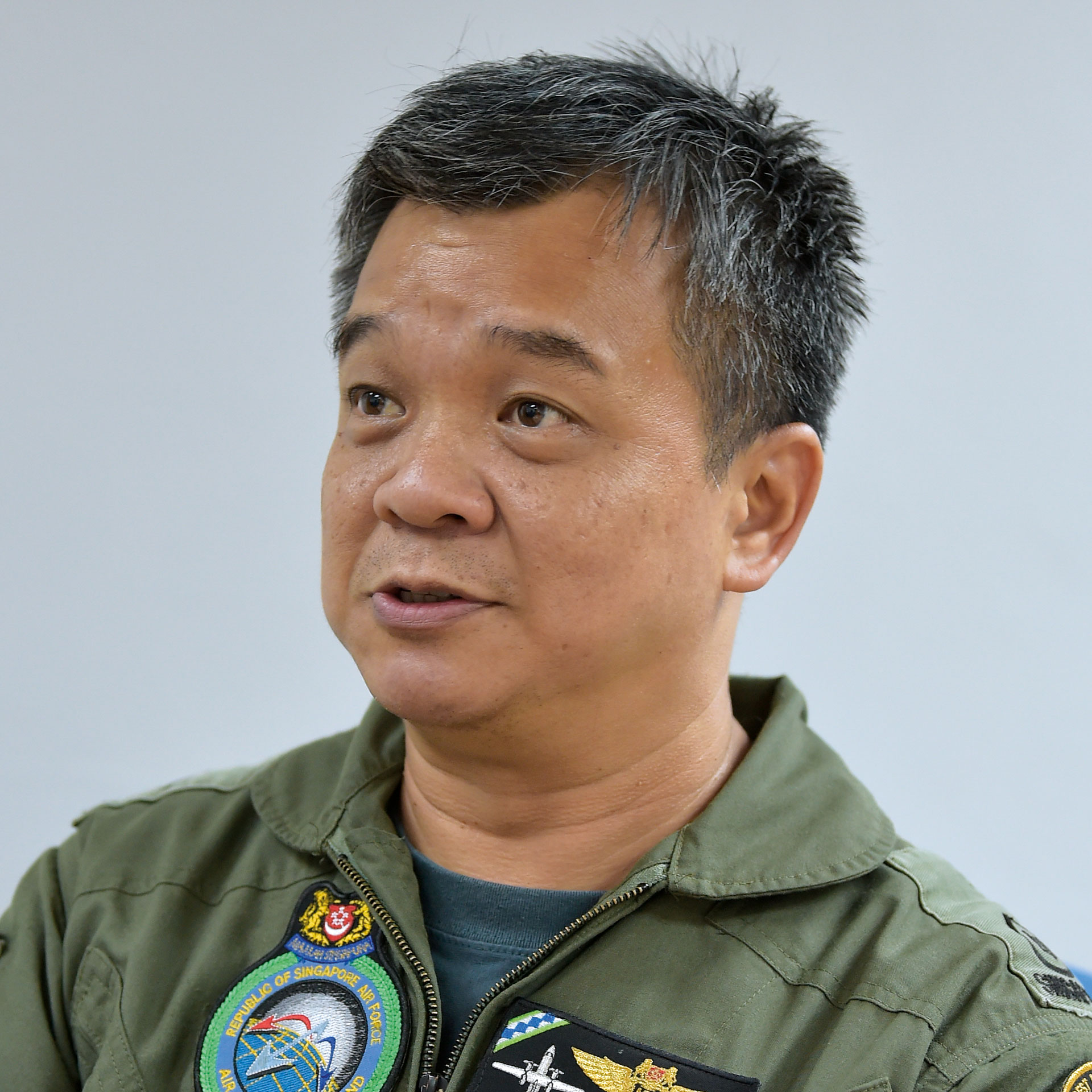
SSG WYNNE TAN
Platform trainer, Motorised Infantry Training Institute (MTI)
FOLLOWING HER HEART
Even when everyone was against her joining the Army, Staff Sergeant (SSG) Wynne Tan never lost sight of her dream job.
"Everyone thought I was crazy and no one supported me! But I knew I wanted something different and ever-changing — a career that no one would expect me to be doing."
To assure her family that she wasn't rushing into things, the 29-year-old worked in an advertising firm for six months in Shanghai. After returning, she took on several jobs before deciding that she still wanted a military career.
The decision turned out to be one of the best she's ever made — she's passionate and looks forward to work every single day. She even met her husband there!
Personal touch
While this may be her dream job, it is not without its fair share of challenges, especially when it comes to being a leader.
When she was first posted to 5th Battalion, Singapore Infantry Regiment (5 SIR) as a section commander, SSG Tan was worried about how her troopers would take to her.
"It was intimidating initially because I didn't know if the troopers would listen to me. But I realised I didn't have to put so much pressure on myself and that it's my presence that actually matters most to them."
To gain their trust, she took time to accompany her troops in tasks such as route marches. And after training, she interacted with them to find out more about their lives. If she sensed there was something amiss, she would talk them through their problems.
"The next thing I know, the troopers started to consult and confide in me like I was their big sister!" said SSG Tan with a laugh.
After being posted to MTI last December, she took on her current role as a platform trainer, teaching soldiers to operate the Belrex Protected Combat Support Vehicle (PCSV) and the Terrex Infantry Carrier Vehicle.
Since the training she conducted was a three-week course instead of the two-year journey she had in 5 SIR, she employed a different method to break the ice — by learning all 34 troopers' names within two days.
Said SSG Tan: "These simple things make a difference. When you remember their names, it makes them feel that they matter, instead of being just another face in the course. They feel happier, and become more motivated and receptive to what I'm saying."
When the tough gets going
A year ago, she went straight back to leading her troopers as a platoon sergeant in 5 SIR as soon as her four-month maternity leave ended.
Apart from the chaos of looking after a newborn son who was waking up every hour in the night, SSG Tan had to muster energy to train her troopers in the day, even if it meant doing everything with them — including going outfield.
"It was very tiring and I didn't get more than four hours of sleep a day, but I guess I got used to it."
Even when things got tough, SSG Tan never once regretted her decision to sign-on. In fact, she attributes the Army for shaping her into the resilient woman she is today.
She shows the same indefatigable spirit when building bonds with the men under her charge.
"We WOSpecs are very hands-on people, so we work closely with our troopers. It's up to us to build their characters and make their National Service (NS) experience a positive and meaningful one.
"Seeing them grow from boys to men is my biggest motivation and satisfaction."
SOMEONE WHO INSPIRED HIM
2WO Judy Law - Women Recruiter, Army Recruitment Centre. She was SSG Tan's platoon commander at the Basic Military Training Centre.
"She's faced many challenges but remains positive and committed to her job. She's a mother of three and treats every soldier like her child. Being a mum myself, I know how hard it is to juggle both work and family, so I have utmost respect for her."
What her trainee says:
"She trains us with so much passion to make us better soldiers. She also takes the effort to remember who you are, which is very nice and refreshing. If there's a chance to train under her again, I will look forward to it."
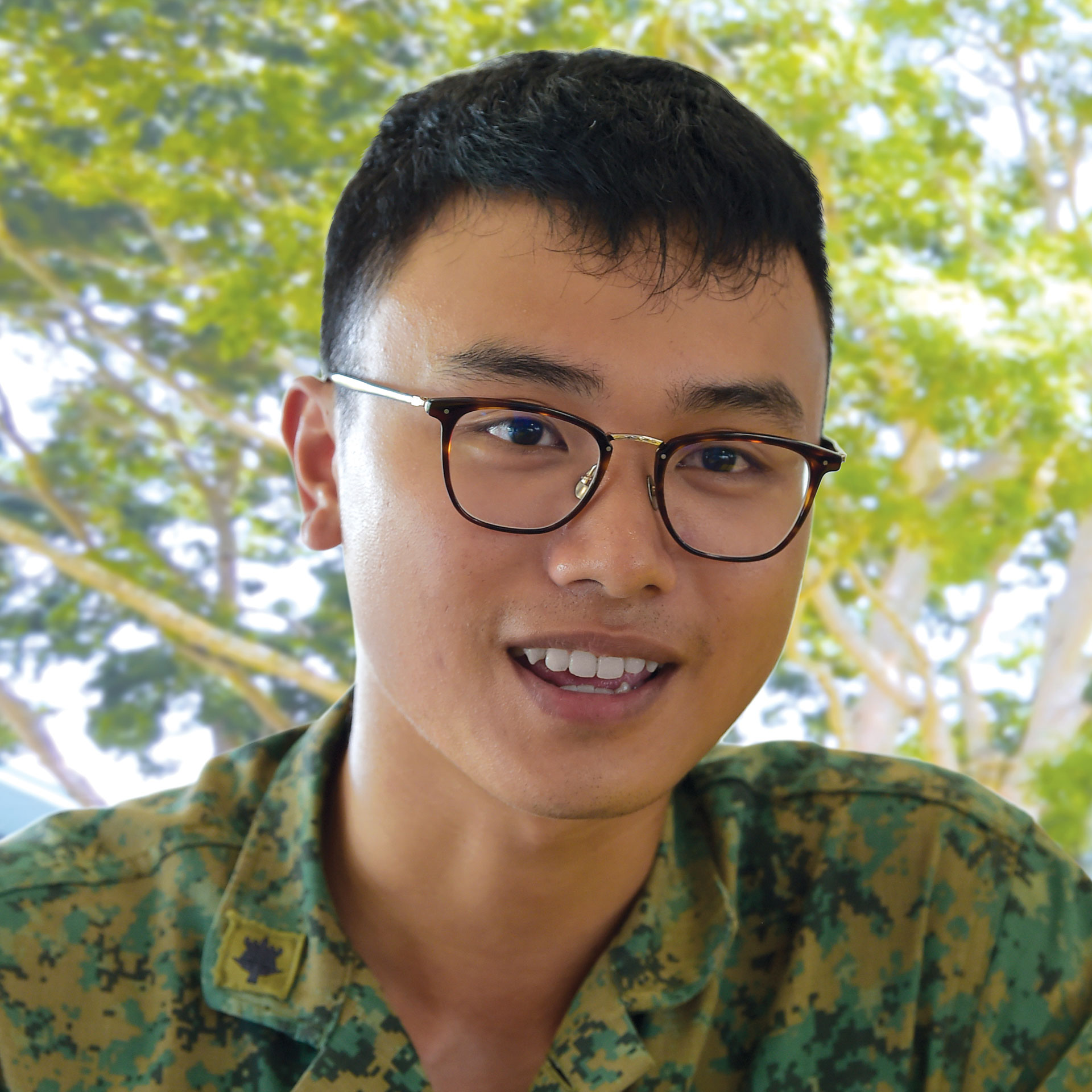
1WO NG BAN SWEE
Chief, Clearance Diving Unit (CDU), Clearance Diving Group (CDG)
The friendly Godfather
Despite the Godfather nickname, 1WO Ng Ban Swee is nothing like the mafia boss figures in the 1972 movie. The 47-year-old never fails to lend a listening ear and his door is always open to those in need of counsel.
But he wasn't always this caring and helpful. "When I was younger, I thought that having a stern face was the way to lead, but it didn’t work so well."
1WO Ng decided to smile more and started engaging his trainees to gain their trust and respect. "Things went so much better after that — my trainees would do more than what they were supposed to because they knew that I cared," said 1WO Ng.
Never stop learning
In 1999 with his Commanding Officer's encouragement, 1WO Ng mustered the courage to pursue a three-year diploma in Mechatronic Engineering at Nanyang Polytechnic, sponsored by the Republic of Singapore Navy. It had been seven years since he hit the books, but the then-29-year-old did not let that get him down.
In fact, he topped his cohort for five out of six semesters and achieved a Gold Award despite being a decade older than his peers and having to take care of a newborn son.
He also took the initiative to organise study sessions, discuss tutorial topics and come up with mock exam questions for his younger course mates.
"I think I matured when I became older," said 1WO Ng, who dropped out from Ngee Ann Polytechnic during his teens.
"It was tough balancing studies and family but I was thankful for my family's support. I would only do my school work after they slept just so that I could spend time with my wife and son."
After attaining his diploma, 1WO Ng went on to attend two bomb and munitions disposal courses in the United Kingdom. Before that, he attended an Explosive Ordnance Disposal (EOD) course in the United States in 1997, where he was named an Honour Graduate for being the top student during the underwater phase.
"These courses gave me the knowledge, competency as well as confidence to be a bomb disposal diver in the CDG. I also learnt to work with foreign counterparts and gained a deeper understanding of their perspectives and procedures."
In 2009, he attended the SAF's Joint Warrant Officer Course and bagged the Book Prize award for outstanding performance. Three years later, he applied for the Learning Science programme at the National Institute of Education to improve his teaching skills.
"A lot of WOSpecs today have a thirst for knowledge and we are constantly upgrading ourselves to improve our training methods and better relate to our trainees," explained 1WO Ng.
"By taking on courses and diplomas, we also set an example for the trainees to show that they can do it too."
An open heart
As Chief CDU, 1WO Ng has taken a step back from training and trusts his instructors to take full control.
But the father-of-two still makes an effort to engage his divers, especially the Full-time National Servicemen (NSFs) who enter the Naval Diving Unit.
"I treat these NSFs like my sons and the older divers, my brothers. I know that this generation wants to know the reason and purpose for everything that we do, so I will always do my best to explain."
Apart from cultivating an encouraging environment for his instructors and trainees to voice their opinions and concerns, 1WO Ng even took up a para-counselling course recently just to be better equipped to help people.
"My priority is to understand and help them as much as I can," said 1WO Ng.
So what is it that makes him go the extra mile? "Just a simple 'thank you' is motivation enough to keep me going."
SOMEONE WHO INSPIRED HIM
MWO (Ret) Wong Keng Tuck - Former EOD 2nd-in-charge, CDG
"He's a fatherly figure and I always call him Uncle Wong. I saw how he was always there for his divers and how they respected him in return, so I picked up his traits."
What his trainee says:
"He really treats us like his sons. If we have any problems, he is always there for us.
He is a great mentor, very understanding and often goes out of his way just to help us."
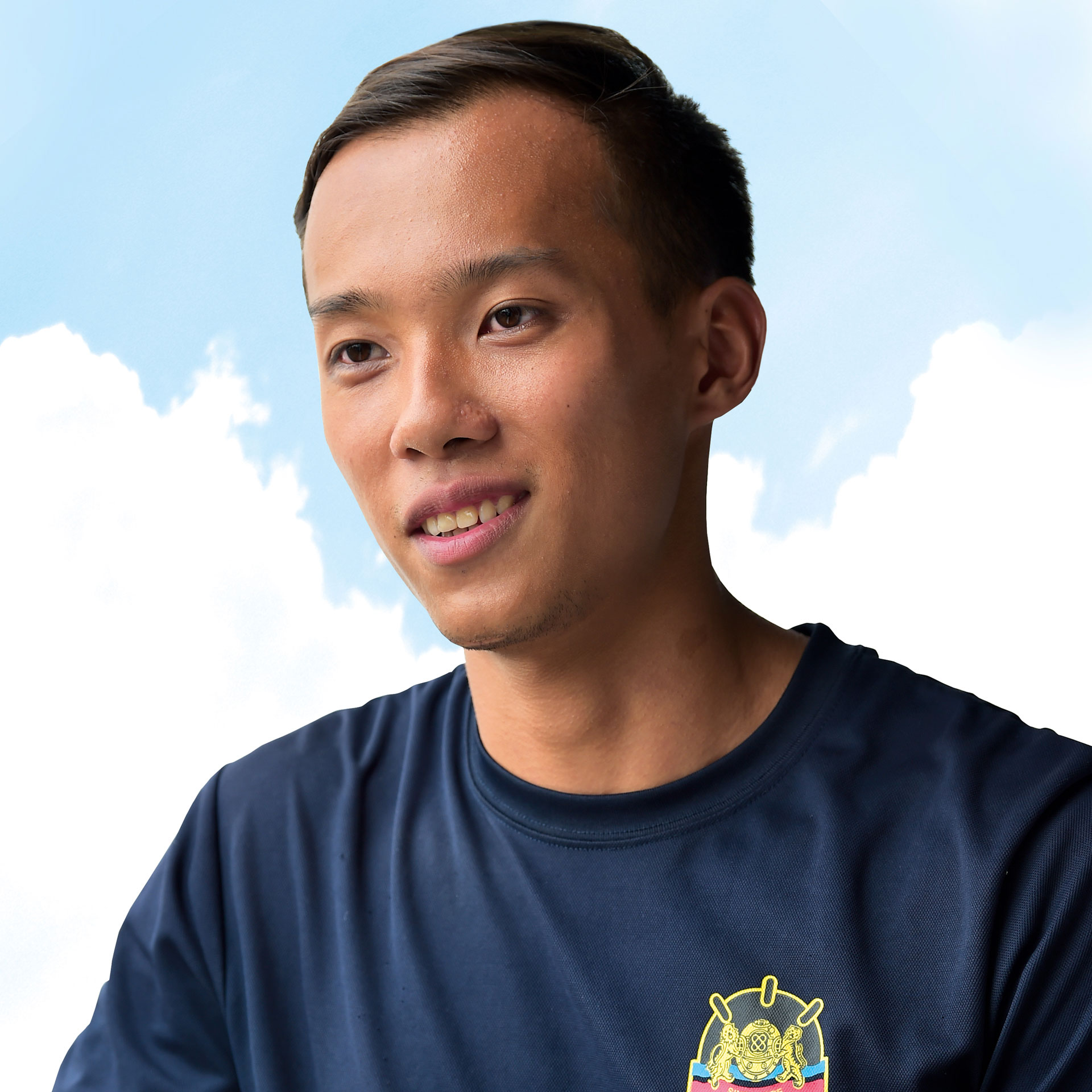
SSG MARK ROMARIO
Senior Trainer, Subject Matter Expert (SME) Branch, Basic Military Training Centre (BMTC)
Training enthusiast
Barely minutes after ending a motorcycle lesson, SSG Mark Romario received a call informing him that he had been activated to set up tents at the Padang. It was the week of founding Prime Minister Lee Kuan Yew’s passing in 2015.
His unit worked through the night, building close to 200 tents. These tents were meant to shelter civilians, who were queuing to pay respects to the late Mr Lee, from sun and rain.
"From the polytechnic students to the elderly, people were cheering us on. They also passed us their water bottles. Even when the fatigue kicked in, it was a heart-warming experience," recalled the 28-year-old, who was a section commander in 3rd Battalion, Singapore Guards (3 Gds) back then.
People person
For SSG Romario, his career has been nothing short of fulfilling. He enjoys engaging people and has encountered characters from all walks of life in the Army.
During his platoon sergeant tour in 3 Gds two years ago, he had several rowdy and short-tempered trainees under his charge, one of whom even challenged him to a fight.
"The trainee brought his handphone to the training ground when I specifically told them not to. When I confronted him, he became very aggressive and raised his voice at me."
The trooper even charged at him, only to be restrained by his platoon mates who then pried the phone out of his hands.
After the training exercise, SSG Romario had a private conversation with the trooper and learnt that he was having family, financial and relationship problems. The trooper had brought his handphone out as he wanted to talk to his girlfriend. Post-incident, SSG Romario counselled him and the trooper eventually became more enthusiastic in his training.
"That incident really broadened my perspective and I learnt that the best way to handle aggressive people was to remain calm and try to reason with them," said the Ngee Ann Polytechnic alumnus.
"I also tend to treat my troopers like adults, and the respect and understanding usually go both ways."
Apart from NSFs, SSG Romario also trained an all-female platoon from the SAF Volunteer Corps in April.
Of the 45 trainees, three were above the age of 40. They were of varying fitness levels but what struck him about these women was their passion: no one wavered in the face of tough training.
"When you see how enthusiastic and passionate they are, you are inspired as well."
Flexible approach
Since being posted to BMTC as a senior trainer under the SME branch last July, SSG Romario has had the opportunity to be attached to various companies and observe how different commanders guide their recruits.
Apart from using visual aids and explaining by demonstrating, the elder of two siblings often reads philosophical books and notes down catchy phrases to engage his trainees. It helps that he's a natural and humorous story-teller.
"When I see people about to doze off, I will engage them in a more comical way to get their attention,” said SSG Romario with a laugh. His humour was evident: during PIONEER's photoshoot, he had his recruits entertained for a good 45 minutes.
"One of the biggest misconceptions about WOSpecs is that we are very rigid and we have fixed mentalities on how to do a particular drill. But we've changed a lot. As next-generation WOSpecs, we are more flexible in our training methods and more hands-on in our approach.
"More importantly, we must be able to take criticism, especially if it can make us a better teacher, soldier or person."
Sounds like he's got it all worked out.
SOMEONE WHO INSPIRED HIM
1WO Cheng Joo Teck - Master Trainer, HQ BMTC
"He's above 40 but he's able to clock under nine minutes for his 2.4km run. Even though he can't speak English well, he always tries his best to articulate his points with humour and makes his training as interesting as possible."
What his colleague says:
"He's efficient, professional and very easy to work with. Whenever anyone needs help, he will always do his best to help out. In short, he's one of the best colleagues around."
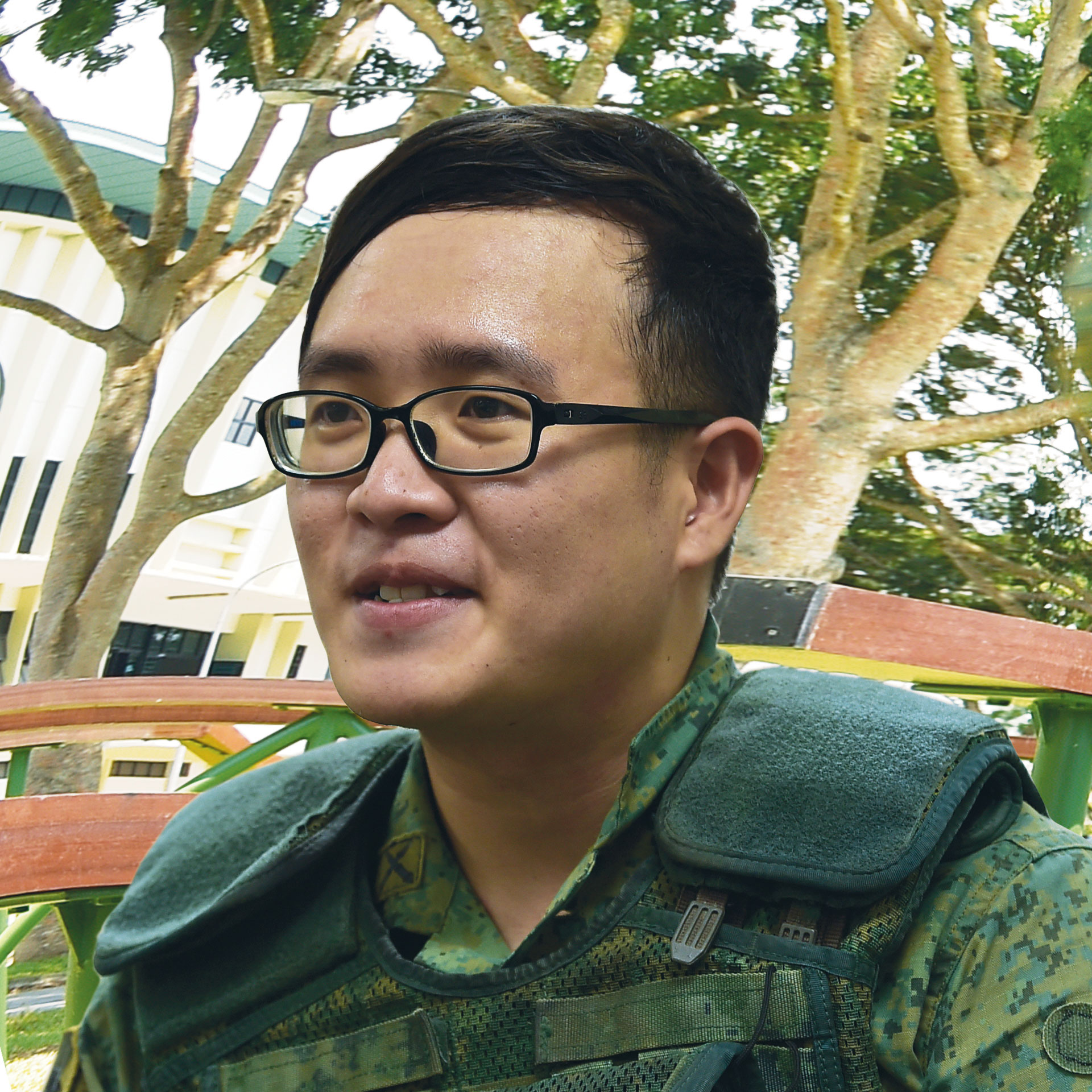
ALSO READ IN PEOPLE
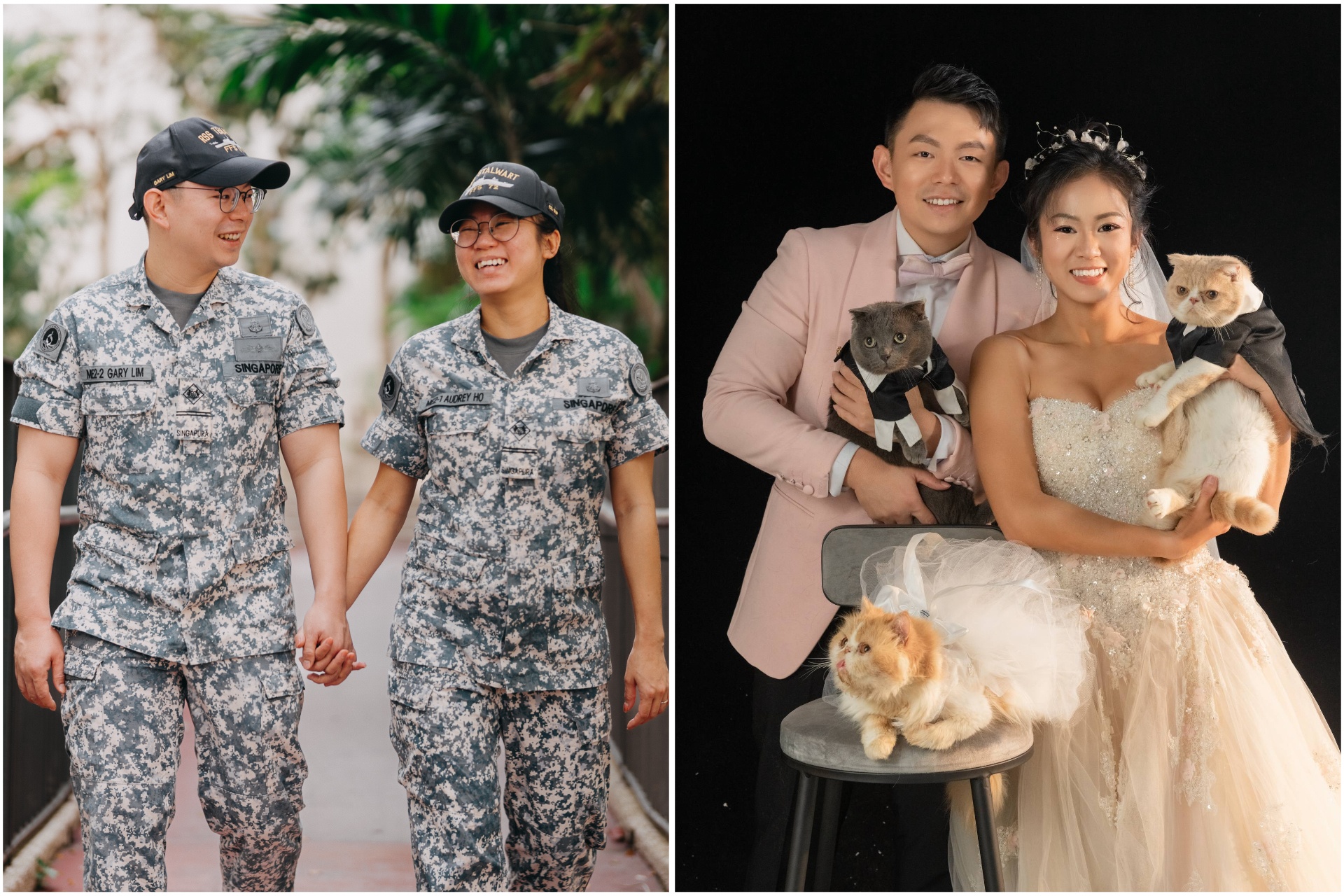
When two hearts set sail together
13 Feb 2026
Naval engineers ME2 Gary Lim and ME2 Audrey Ho share how they navigate love, military service, and (soon) parenthood.
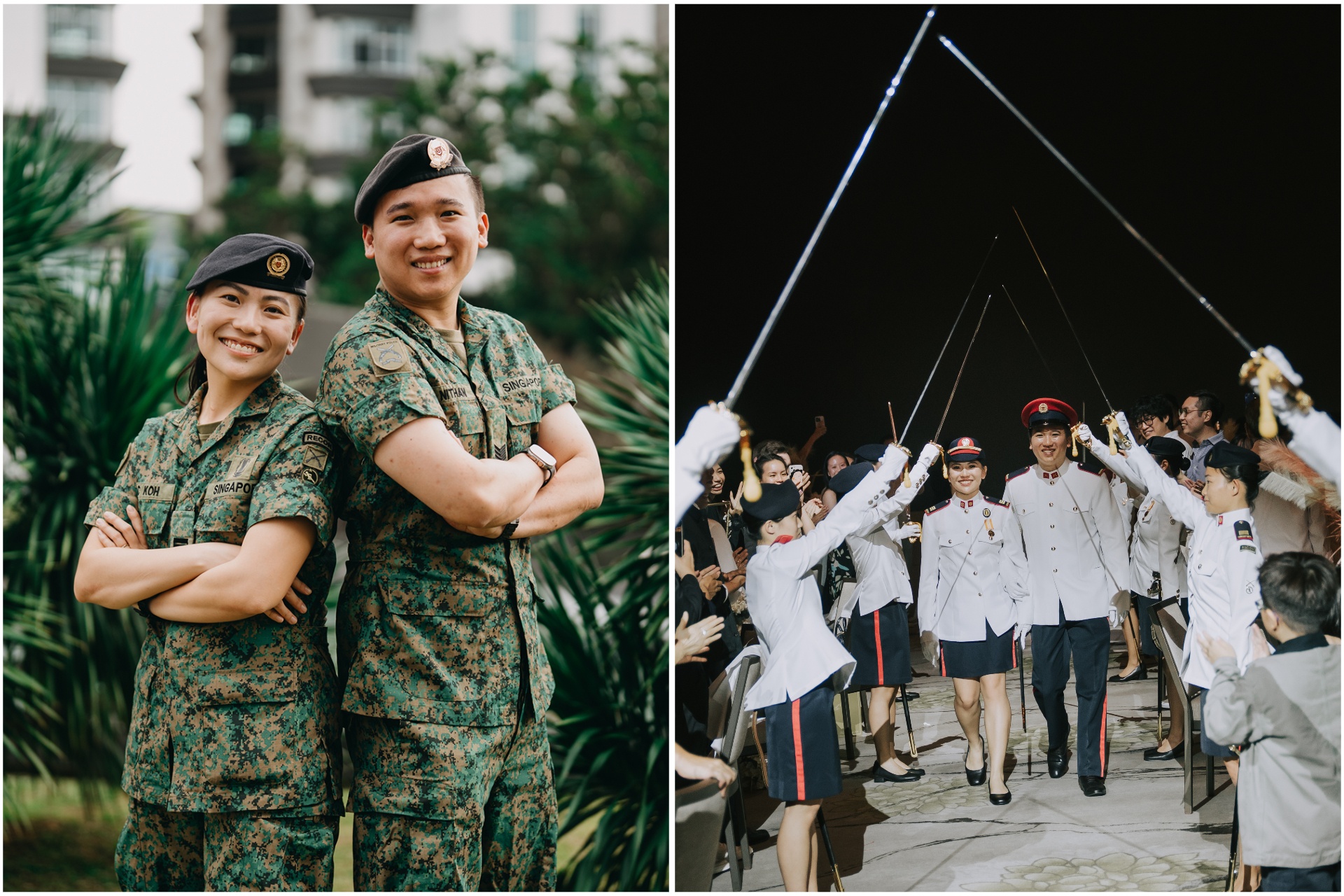
I’ve always got your back
11 Feb 2026
She’s an Army officer, and he’s the (NS)man supporting her dreams. CPT Koh Xinci and 3SG (NS) Nitro Chan share their love story with us – including their unique wedding!
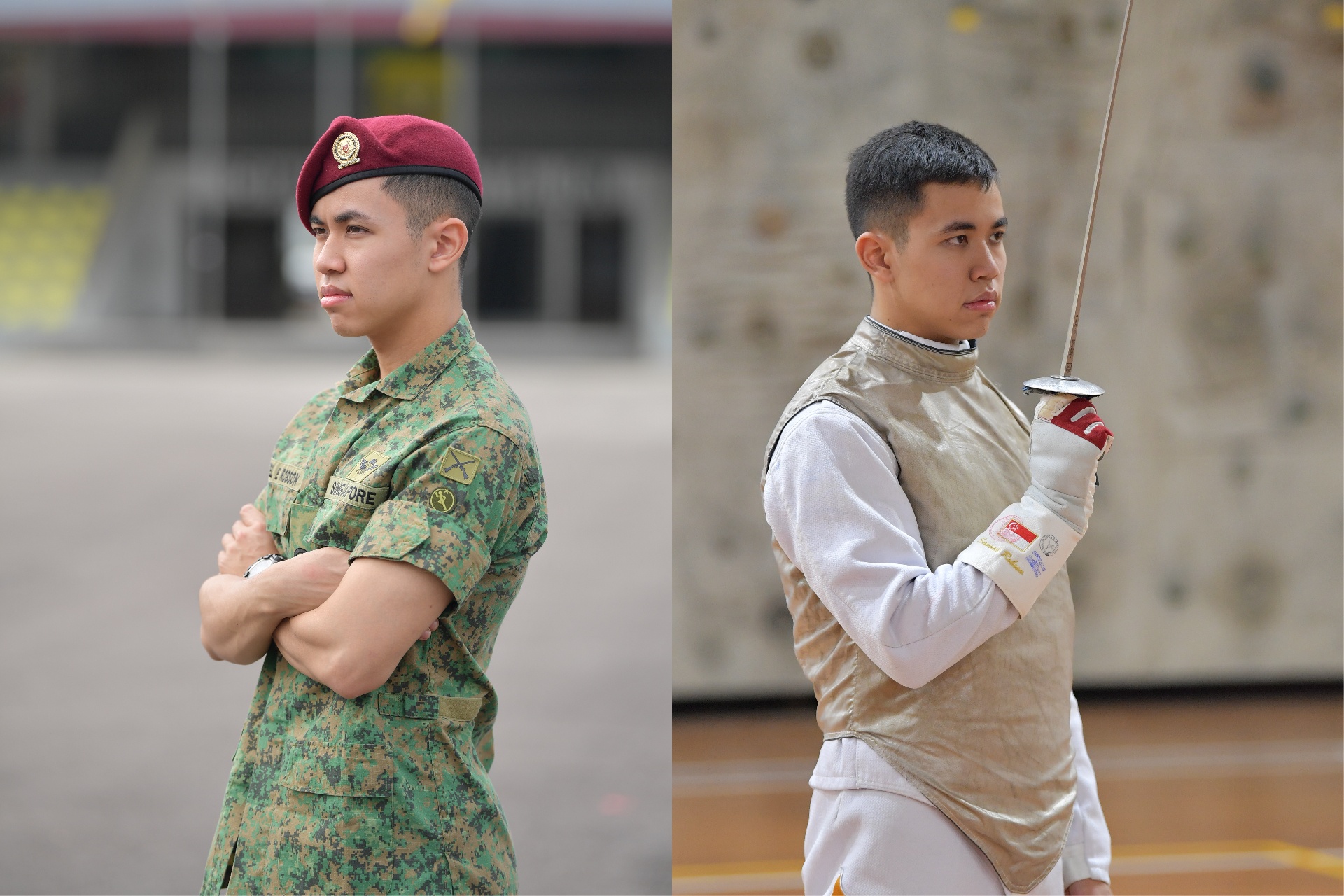
He’s an NSF Commando & medal-winning fencer
28 Jan 2026
His team won gold at the SEA Games 2025, and he hopes to represent Singapore in more competitions to come. Meet fencer CPL Samuel Elijah Robson, who is serving as a Commando during his full-time NS.

